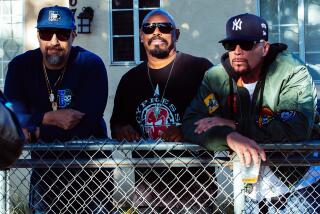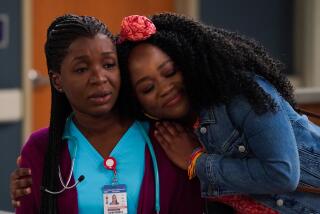After-School Dramas Share Vital Messages
- Share via
CBS Television recently announced that its “Schoolbreak Specials” (afternoon dramas for teens) were being terminated. We lament this decision, which both saddens and surprises us.
In August 1994, we were two of 10 selected writers who participated in the American Film Institute’s annual Television Writers Summer Workshop “Writing the Afternoon Special.” In fact, our classmate Kathryn Makris was the author of the final CBS “Schoolbreak Special,” “Crossroads.”
In the workshop, every writer, producer and director reiterated the fact that these programs lose money. No one participates in afternoon specials to achieve high ratings. They are made because everyone involved is thoroughly committed to this unique genre dedicated to teens. In fact, one director told us that when his budget ran out, the crew worked overtime at no charge because they believed so strongly in the subject matter (literacy) and the importance of giving young viewers the message to stay in school.
Schools often received discussion materials as companion pieces to the programs, which many times were watched in the classroom. In fact, that is the viewing experience of one of us, who preferred “Gilligan’s Island” reruns as after-school fare, but nevertheless watched afternoon specials in freshman and sophomore high school health classes.
Programs about anorexia nervosa, the effects of marijuana and drunk driving stand among the few hours of television one of us remembers more than a decade later. The impact of “But He Loves Me,” which portrays a teenage girl in a physically abusive relationship with her boyfriend, or “Other Mothers,” in which a teen reconciles with his biological mother and her lesbian partner, are equally moving to an adult.
*
Afternoon specials are not the only means to present and discuss serious issues with teenagers. Yet they provide a valuable source of information for the adolescent audience, an age group often patronized in other areas of programming. In a time when frank discussion in public schools about drugs, sex and AIDS is constantly threatened, afternoon specials have been a universally accessible forum for teens to explore problems specific to their own experience.
Afternoon specials allow teens to explore issues they often can’t talk about at home or don’t want to talk about in school: What if I’m gay? How do I know if my parent is an alcoholic? Am I the only one who thinks about suicide?
Teens have many options when they are troubled or uninformed: peer hotlines, guidance counselors, public libraries. But like adults, they’re probably more likely to turn on the television for answers, privacy or escape than turn to a guidance counselor or research their problem at the library.
In this era when daytime television is populated by ever more racy soap operas and debauched talk shows, the afternoon special (aired at most only eight times during the school year) was a rare, valuable television experience for the young. That these shows are low-rated and unprofitable is nothing new. Rather, they are an example of television at its most responsible. Perhaps, given their negative contribution to the bottom line, afternoon specials have been living on borrowed air time since their inception. We regret that the major broadcast networks won’t loan more of this time to the next generations of teen audiences however small they may be.
More to Read
The complete guide to home viewing
Get Screen Gab for everything about the TV shows and streaming movies everyone’s talking about.
You may occasionally receive promotional content from the Los Angeles Times.






